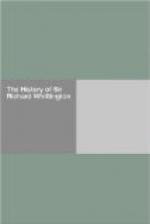After that he was chose
Shriefe of the citty heere,
And then full quickly rose
Higher as did appeare.
For to this cities praise
Sir Richard Whittington
Came to be in his dayes
Thrise Maior of London.
More his fame to advance,
Thousands he lent his king
To maintaine warres in France,
Glory from thence to bring.
And after, at a feast,
Which he the king did make,
He burnt the bonds all in jeast,
And would no money take.
Ten thousand pound he gave
To his prince willingly,
And would not one penny have.
This in kind courtesie.
God did thus make him great,
So would he daily see
Poor people fed with meat,
To shew his charity.
Prisoners poore cherish’d were,
Widdowes sweet comfort found;
Good deeds, both far and neere,
Of him do still resound.
Whittington Colledge is
One of his charities,
Records reporteth this
To lasting memories.
Newgate he builded faire,
For prisoners to live in;
Christ’s Church he did repaire,
Christian love for to win.
Many more such like deedes
Were done by Whittington;
Which joy and comfort breedes,
To such as looke thereon.
Lancashire thou hast bred
This flower of charity;
Though he be gone and dead,
Yet lives he lastingly.
Those bells that call’d him so,
‘Turne again, Whittington,’
Call you back may moe
To live so in London.”
This ballad, as it stands here with the exception of the last stanza, was reprinted in A Collection of Old Ballads, 1823, vol. i. p. 130.
This ballad is the original of all the later ballads, although the titles have been greatly varied. The Roxburghe ballad (vol. iii. p. 58) is dated in the British Museum Catalogue 1641[?]. Its full title is as follows:—
“London’s Glory and Whittington’s Renown, or a Looking Glass for Citizens of London, being a remarkable story how Sir Richard Whittington (a poor boy bred up in Lancashire) came to be three times Lord Mayor of London in three several kings’ reigns, and how his rise was by a cat, which he sent by a venture beyond sea. Together with his bountiful gifts and liberality given to this honourable City, and the vast sums of money he lent the King to maintain the wars in France; and how at a great Feast, to which he invited the King, the Queen, and the Nobility, he generously burnt the writings and freely forgave his Majesty the whole Debt. Tune of ‘Dainty, come thou to me.’ London: Printed for R. Burton, at the Horse Shoe in West Smithfield.”
The bulk of the ballad is the same as Richard Johnson’s, but the following first stanza is added, the original first stanza becoming the second:—
“Brave London Prentices,
Come listen to my song,
Tis for your glory all
And to you both belong.
And you poor country lads,
Though born of low degree,
See by God’s providence
What you in time may be.”




